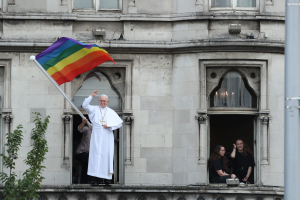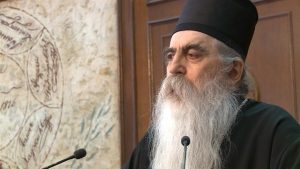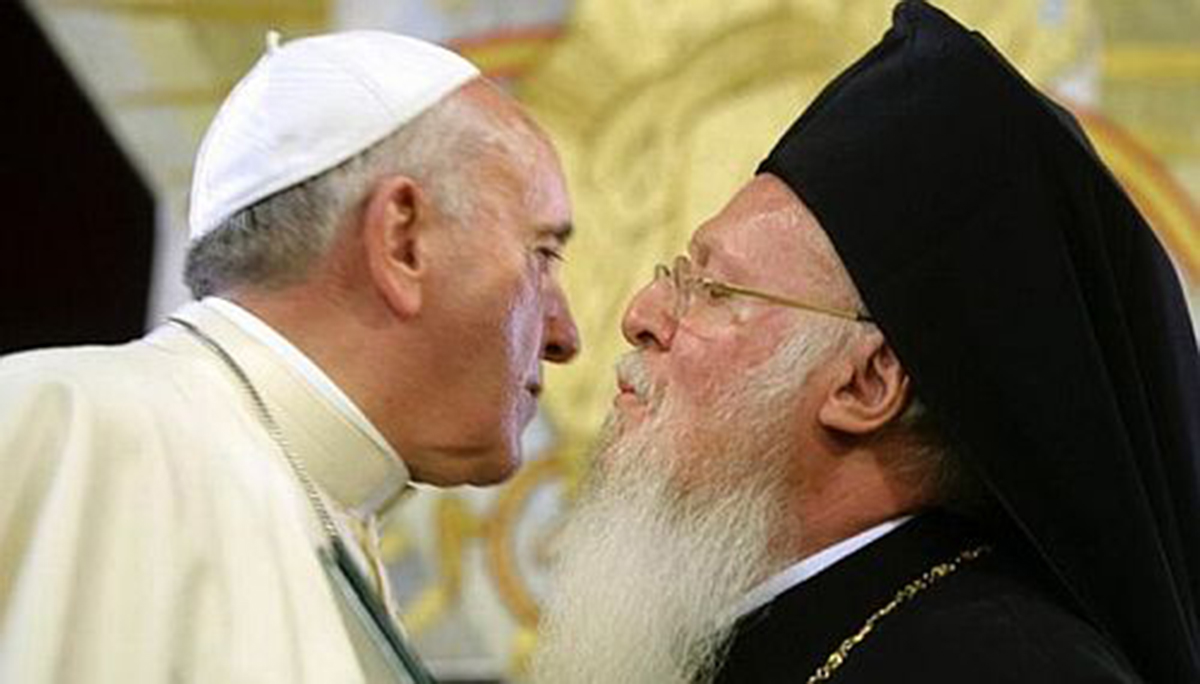Written By Diogenis Valavanidis
The Greek website "Fos Phanariu" (translated: light of Phanar) is 6.12. O. G. transmitted an article titled: "Ecumenical Patriarch: it is unacceptable today, at the beginning of the 21st century. a century, to continue to live with fanaticism, small-mindedness and prejudice.“ The article states that the head of the Patriarchate of Constantinople said: "што as most Orthodox churches celebrate the great holiday of Christmas on the 25th. December, the same date each year as the Roman Catholic Church; just as the Roman Catholic communities in Greece observe the Orthodox canon for determining the date of Easter in order to celebrate it together with their Orthodox brethren; just as in Finland for many years the date of Easter has been common to all Christians, we propose that it be established on a pan-Christian level, and especially on the basis of the way of determining the date of Easter under the Orthodox Church.“
For the sake of truth, at this point we would like to point out that the determination of the observance of the day of Easter in the Orthodox Church cannot be interpreted arbitrarily and according to one's personal opinion, regardless of whether it is ecumenical, papist, political or geopolitical motives, but it is established and stems from the decision of the First Ecumenical Council (325); the Apostolic canon and many patristic interpretations, according to which: Passover is celebrated on the first Sunday after the first full moon that comes after the spring equinox. On the basis of this rule, all local Orthodox churches are equal (see: Lazar Mirković, Heortology, Belgrade 1961, s. 207).
Patriarch Bartholomew I of Constantinople, instead of acting to calm the upheavals that are taking place in the Orthodox Church and threatening its survival, primarily between the most populous of Moscow and the Patriarchate of Constantinople, among which there has been a break in Eucharistic communion, acts in the opposite way, pouring "oil on fire". In addition, we state that in a separate text which is 7.12. O. G. published on the same website "Fos Fanariu", Patriarch Bartholomew I spoke about "Putin's 'inhuman politics' and the 'anti-Christian sermon' of the Moscow Patriarch".
We are convinced that the Vatican and Phanar are making a "bill without a tavern", trying to commemorate the 1700th anniversary of the First Ecumenical Council and the joint celebration of Easter in 2025. the Year falls on the same day for Orthodox and Roman Catholics, establishing unity on unhealthy grounds. We say this for a number of reasons, especially considering the fact that two church leaders are irresponsible and anti-Christian: the concepts of " blessing of same-sex marriage."; they disregard the numerous innovations that the Roman Catholic Church has long introduced, as well as other anti-evangelical solutions, and therefore, we believe that in this way they are increasingly moving away from the truth, and leading the prayers of the people behind them to perdition.

Photo By Pope Francis
At this point, we would like to point out the cynicism of the Patriarchate of Constantinople and the Vatican in marking the 1700th anniversary of the First Ecumenical Council (325) attended by Holy Fathers such as St. Nicholas, St. Spiridon, St. Achilles and others, which Anniversary papists and ecumenists wish to abuse. In fact, they contradict this act, because the occasion of the convocation of the First Ecumenical Council at the initiative of Emperor Constantine The Great (305-337), in which 318 bishops participated, was mainly the condemnation of Arius ' heresy, while this Act seeks to obscure all the heresies of the Roman Catholic Church, and the unnatural and the uncanonical way shows "unity" with the Orthodox Church!
We are also surprised that the two church leaders today did not draw adequate lessons from the events of 1965. in 1616, Patriarch Athenagoras I of Constantinople and Pope Paul VI of Rome wanted to abolish the anathemas, which had been written in Latin by decree. July 1054. the papal Legates left at the Holy table in the Church of St. Sophia, to which patriarch Michael Kerularius of Constantinople reacted and called a council that decided to return the anathema of excommunication to those who pronounced it. The idea of mutual abolition of the anathema was initiated by the Patriarchate of Constantinople, after which a "Tomos of Love" was issued, which was read in the Basilica of St. Peter in Rome at the Second Vatican Council. During the ceremony, which was attended by 2,399 Roman Catholic participants, the representatives of the Patriarchate of Constantinople had a place of Honor.
In accordance with the then efforts to establish Church unity, the idea of comparing the two churches with the "two lung wings" emerged, by the anti-Catholic Russian Vlasoclav Ivanov. The Roman Catholic Church accepted this idea, appreciating that it helps the process of globalization. It is important to point out that the two churches have ignored the essential causes of schism and anathema, in other words, they have bypassed the truth, which is the basic precondition, with which love forms the whole.
In this regard, it is important to point out, unfortunately, that all the innovations adopted by the Roman Catholic Church, and thereby permanently separated from the Church of Christ of the first millennium, have been completely neglected and ignored. Like then, like today! There are major ecclesiological disagreements, such as Filioque, papal primacy, infallibility, Immaculate Conception of the Theotokos, purgatory, Holy Eucharist, indulgences, baptism, holy anointing, etc.
When it comes to the comparison of the two churches with the “two lung wings“, one of which suffered from numerous heresies, in contrast to the logical medical advice that any physician – pulmonologist would propose, i.e. beginning the use of therapeutic methods in order to cure the diseased lung, the two church leaders continue today with attempts to unite the "two lung wings", ignoring the real danger that the healthy lung wing could become sick from the diseased one, and thus, the Orthodox Church would fall into the trap of heresies. At the same time, such attempts are an attack on the teaching of the existence of only one church, as Jesus Christ founded US, expanded by the apostles and strengthened by the Holy Fathers. Finally, at 9, the article The symbol of faith it is written:"I believe in one holy, catholic and Apostolic Church." Not in two or more churches.
Once Upon a time, the Serbian Orthodox Church could serve as a shining example, when it unilaterally defended itself against Roman Catholic heresies and Uniate attacks. Shortly before the Council of Ferrara and Florence (1438-1439), Byzantium was threatened by the Ottomans, and Western Christians were asked for help. However, the Vatican met the appeal for help from Eastern Christians with blackmail, in other words, they were promised help from the countries of Western Roman Catholic Europe on the condition that they sign a union with the Roman Catholic church, i.e. the Orthodox Church recognizes the Supreme Power of the Vatican. At that time, Serbian ruler despot Đurađ Branković (1427-1456), unlike the rulers of other Orthodox countries, who urged and even encouraged their church dignitaries to participate and accept the decisions of the Uniate Ferraro-Florentine council, resisted numerous pressures and in agreement with Serbian Patriarch Theodosius (1439-1449) decided that the Serbian Orthodox church would not send a delegation to that Uniate Council, as revealed by one of the most renowned canonologist historians and scientific advisor to the Historical Institute of the Serbian Academy of Sciences and arts, Prof. Dr Miodrag M. Petrović, in the book "Serbia at the crossroads of East and West", Belgrade 2013, p. 147. According to him, patriarch Teodosije is the Serbian mark of Ephesus.
Despite all the warnings and obvious dangers to the survival of the Orthodox Church as a whole, what can be said about today's Orthodox ecumenists who accept intercommunion?
The answer to this question was most accurately given by the mentioned Prof. Dr. Miodrag M. Petrović, in the above mentioned book, s. 148-149:
«And as individuals from the Orthodox churches serve 'papocentrism', an example is the speech of Bishop Irinej (Bulovic) of Backa, which he delivered in the Belgrade archdiocese in October 2003. year, marking 25. Pope John Paul II:"believing, therefore, above all all Roman Catholic believers in every bishop, and especially in the first among their bishops, he who for a number of centuries, for a whole 1000 years, was the first bishop of the whole Christian universe or ecumenical, while there was a single and only Christian ecumenical, we hope let us pray to the Holy Spirit that, once and for all, if this is accomplished in history, as we hope and pray, again, according to the ancient canonical order, the bishop of the city of Rome will be the first bishop of the Christian universe."
"Bishop Irinej of Backa is most responsible for the event held in Belgrade in September 2006. year, meeting of the mixed Dialogue Commission. There is enough for such a mission. And as if he were not satisfied with what the mixed Dialogue Commission has achieved over the past 30 years, he further seeks to speed up the walk towards the Union. As if the existing ‘historic bridges’ were insufficient, so it additionally resorted to some new bridges. Thus, recently, in the Diocese of Srem, without regard to the strict canonical principles on the inviolability of the rights of every hierarch within the borders of the area he governs, he organized on Fruska Gora, an ‘international theological and pedagogical meeting of catechists (teachers of religion)’. The meeting was held at the iriški Venac, in the Norcev hotel owned by Croatia, ‘from 2. To 7. September 2008. in the organization of the Orthodox Diocese of Backa and the Roman Catholic Archdiocese of Belgrade, in cooperation with the Evangelical Church of Germany and traditional churches of the Reformation in Serbia, with the support of the Konrad Adenauer Foundation».

Photo: Bishop Irinej of backI
Unfortunately, as we can see from the example above, we must note that ecumenism and papism have spread today as an infectious disease, from which many church dignitaries of the local Orthodox churches have fallen ill. Small as well as big! Therefore, it is necessary to make a public call in all local Orthodox churches for the isolation of all spiritually ill bishops (patriarchs, archbishops, Metropolitans, bishops, etc.) for the survival of the One Holy, Catholic and Apostolic Church – our only Orthodox Church, which is existentially threatened in today's time, more than ever before in its long history.
In conclusion, it is necessary to point out that when it comes to Patriarch Bartholomew I of Constantinople, all his steps and activities directed towards the Papist ideology, do not bring any good strengthening of unity among the local Orthodox churches and Orthodoxy as a whole. On the contrary, this causes immense damage primarily to the Patriarchate of Constantinople as an institution whose mission in the Orthodox world should be focused on the protection of the church-canonical order. Any decision or activity of Patriarch Bartholomew I, if it does not reflect conciliarity, i.e. the unanimous vote of all the heads of the local Orthodox churches discredits his dignity and deprives him of the right to act on behalf of the entire Orthodox Church. Nevertheless, if the patriarch of Constantinople decides to unilaterally sign any document or even "union" with the Roman Catholic Church, it will by no means mean that the entire Orthodox Church has become Uniate, but by such action the Patriarchate of Constantinople and its primate will lose the reputation, respect and role that they have enjoyed for centuries.the Orthodox world.
As for the local Orthodox churches, even the smallest ones that do not follow the Papist ideology, they will have in them the fullness of a holy, catholic and Apostolic Church with an ecumenical mission, even if they are reduced to a "small flock", to which the saviour says: "Do not be afraid"! (Luke 12: 32).
Source: Center for Geostrategic Studies
15. December 2024.

